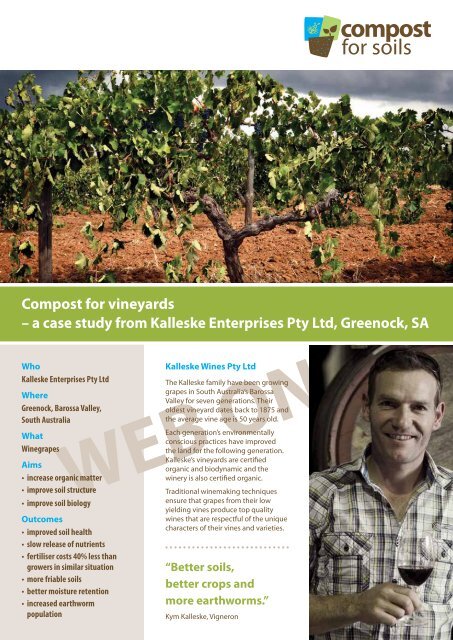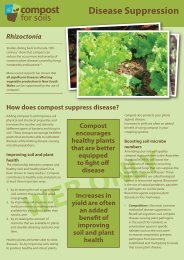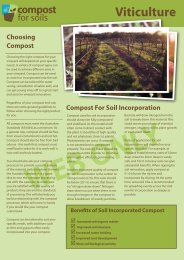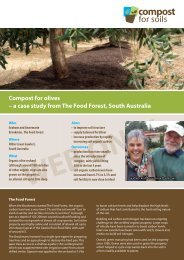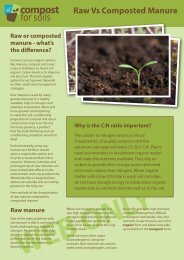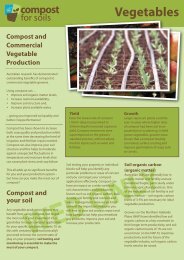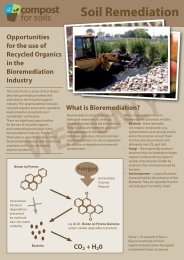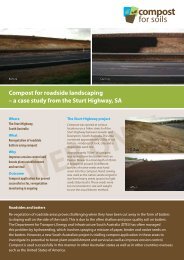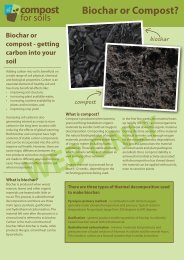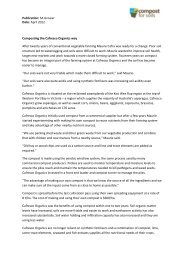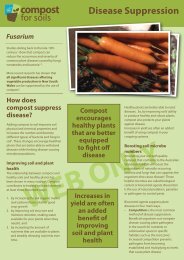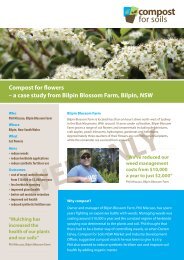Kalleske Enterprises Pty Ltd - vineyards - Compost for Soils
Kalleske Enterprises Pty Ltd - vineyards - Compost for Soils
Kalleske Enterprises Pty Ltd - vineyards - Compost for Soils
Create successful ePaper yourself
Turn your PDF publications into a flip-book with our unique Google optimized e-Paper software.
o<br />
compost <strong>for</strong> soils<br />
<strong>Compost</strong> <strong>for</strong> <strong>vineyards</strong><br />
– a case study from <strong>Kalleske</strong> <strong>Enterprises</strong> <strong>Pty</strong> <strong>Ltd</strong>, Greenock, SA<br />
Who<br />
<strong>Kalleske</strong> <strong>Enterprises</strong> <strong>Pty</strong> <strong>Ltd</strong><br />
Where<br />
Greenock, Barossa Valley,<br />
South Australia<br />
What<br />
Winegrapes<br />
Aims<br />
• increase organic matter<br />
• improve soil structure<br />
• improve soil biology<br />
Outcomes<br />
• improved soil health<br />
• slow release of nutrients<br />
• fertiliser costs 40% less than<br />
growers in similar situation<br />
• more friable soils<br />
• better moisture retention<br />
• increased earthworm<br />
population<br />
<strong>Kalleske</strong> Wines <strong>Pty</strong> <strong>Ltd</strong><br />
The <strong>Kalleske</strong> family have been growing<br />
grapes in South Australia’s Barossa<br />
Valley <strong>for</strong> seven generations. Their<br />
oldest vineyard dates back to 1875 and<br />
the average vine age is 50 years old.<br />
Each generation’s environmentally<br />
conscious practices have improved<br />
the land <strong>for</strong> the following generation.<br />
<strong>Kalleske</strong>’s <strong>vineyards</strong> are certified<br />
organic and biodynamic and the<br />
winery is also certified organic.<br />
Traditional winemaking techniques<br />
ensure that grapes from their low<br />
yielding vines produce top quality<br />
wines that are respectful of the unique<br />
characters of their vines and varieties.<br />
“Better soils,<br />
better crops and<br />
more earthworms.”<br />
Kym <strong>Kalleske</strong>, Vigneron
Why compost<br />
<strong>Kalleske</strong> <strong>Enterprises</strong> want<br />
to ensure they continually<br />
improve their soil health by<br />
increasing organic matter<br />
levels and improving the<br />
biology and structure of<br />
their soils. Over the past<br />
nine years they’ve tried<br />
straw mulch under vines,<br />
a commercial compost<br />
product and now they<br />
make their own compost.<br />
“<strong>Compost</strong> is a very<br />
cost effective option.”<br />
Kym <strong>Kalleske</strong>, Vigneron<br />
“The soil is generally<br />
easier to cultivate,<br />
holds more moisture.”<br />
Kym <strong>Kalleske</strong>, Vigneron<br />
<strong>Compost</strong> application<br />
<strong>Kalleske</strong> <strong>Enterprises</strong> make their<br />
compost from a combination of grape<br />
marc, chaff dust, hay waste, basalt fines,<br />
gypsum, lime, humates, composted<br />
cow manure and chicken manure.<br />
Biodynamic compost preparations are<br />
also added. They spread the compost<br />
with a belt spreader once a year at<br />
2 t/ha at a total cost of $70–80/ha.<br />
Initially they used compost at a rate<br />
of 4 t/ha, but continual improvement<br />
in soil health means that they can now<br />
use half the rate.<br />
Where to from here<br />
<strong>Kalleske</strong> <strong>Enterprises</strong> see using<br />
compost as one of the best things<br />
they have done <strong>for</strong> their soils. As a<br />
certified organic and biodynamic<br />
vineyard, compost fits with their<br />
philosophy of producing grapes<br />
and wines as naturally as possible.<br />
<strong>Kalleske</strong> <strong>Enterprises</strong> recognise that<br />
compost is a sound investment in the<br />
sustainability of their business and<br />
they will continue to make and use<br />
compost in their <strong>vineyards</strong>.<br />
The bottom line...<br />
<strong>Kalleske</strong> <strong>Enterprises</strong> saw the<br />
benefits of using compost in<br />
their <strong>vineyards</strong> within the first<br />
12–18 months. Vigneron Kym<br />
<strong>Kalleske</strong> said using compost<br />
over the last nine years has<br />
continually improved the health<br />
of their soil. The soil now holds<br />
more moisture, is more friable<br />
and earthworm numbers have<br />
increased.<br />
<strong>Kalleske</strong> <strong>Enterprises</strong> don’t use<br />
synthetic fertilisers and have<br />
found that compost provides<br />
a slow release of nutrients <strong>for</strong><br />
their vines. They estimate that<br />
by using compost they are<br />
spending around 40% less than<br />
growers who use synthetic<br />
fertilisers.<br />
It’s difficult <strong>for</strong> <strong>Kalleske</strong><br />
<strong>Enterprises</strong> to estimate the<br />
complete return from compost<br />
use, as improvements in soil<br />
health can be hard to measure<br />
in dollar terms. <strong>Compost</strong> is a<br />
very cost effective option <strong>for</strong><br />
them and investing in compost<br />
has made a big difference to<br />
their biggest asset, their soil.<br />
“<strong>Compost</strong> is one of<br />
the best things you<br />
can do <strong>for</strong> your soil<br />
and soil biology.”<br />
Kym <strong>Kalleske</strong>, Vigneron<br />
For more in<strong>for</strong>mation on the program contact:<br />
o<br />
compost <strong>for</strong> soils<br />
An initiative of <strong>Compost</strong> Australia<br />
www.compost<strong>for</strong>soils.com.au<br />
the resource <strong>for</strong> compost users<br />
© <strong>Compost</strong> <strong>for</strong> <strong>Soils</strong> 2011


